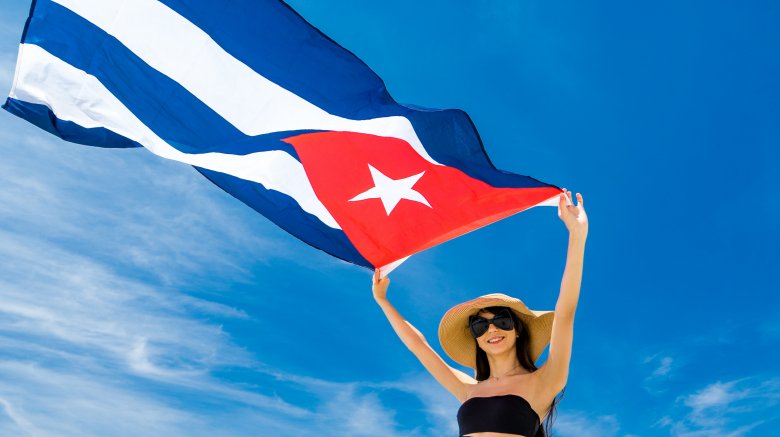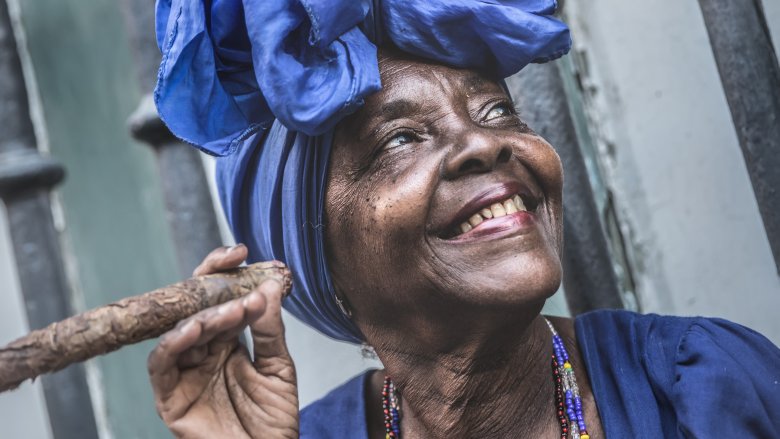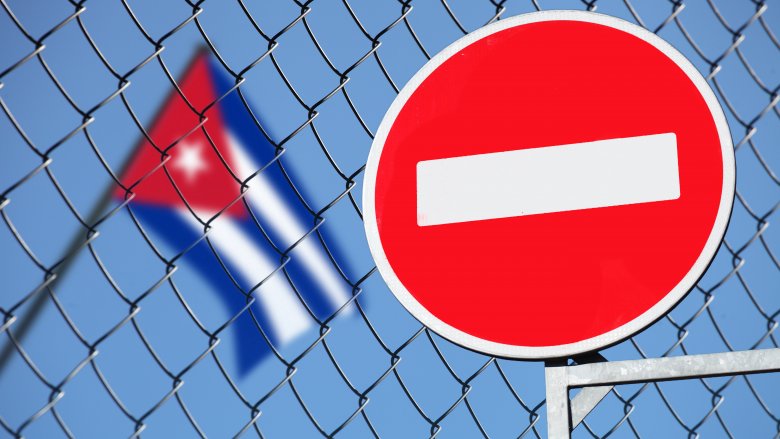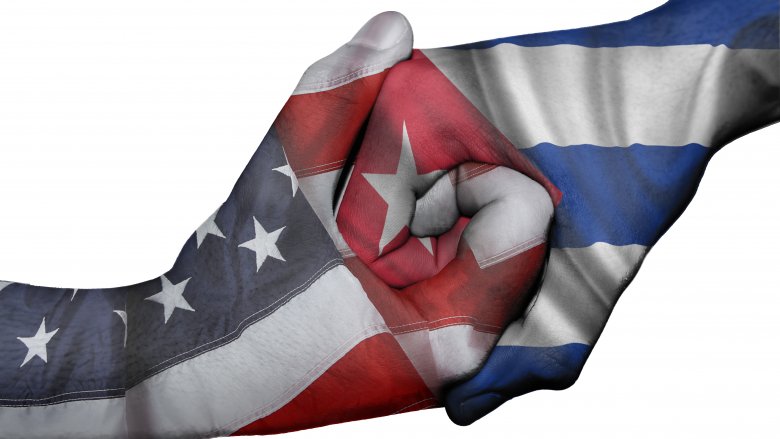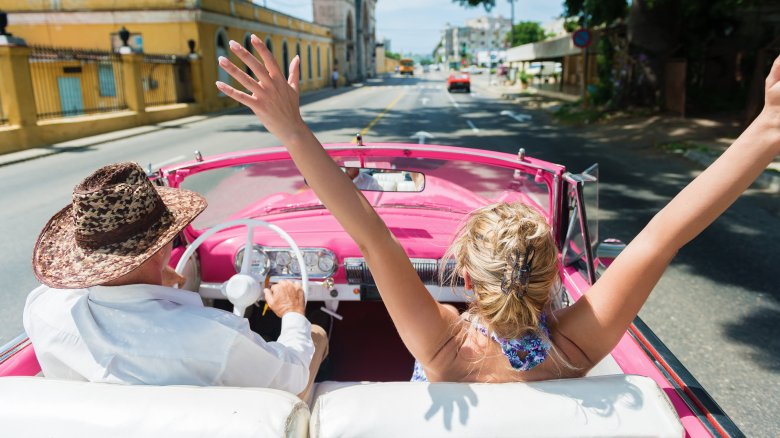False Things About Cuba That Americans Believe
For decades, Americans have wondered what Cuba is like –- how it looks, how it smells, whether its swanky cigars cause exquisite lung cancer. But political and economic alienation have kept it an alien nation. That state of disunion began after Fidel Castro and his photogenic buddy Che Guevara toppled Cuba's U.S.-backed autocrat Fulgencio Batista in 1958. Castro took over in 1959 with America's hesitant blessing but quickly pitted himself against Uncle Sam by warmly embracing Communism amid a bitter Cold War, and heavily taxing American imports. The Eisenhower administration retaliated with a trade embargo in 1960. JFK stiffened the restrictions and made them permanent in 1962.
Since that schism, myths and misconceptions have enveloped Cuba like a thick mist. A history of political histrionics has only deepened such misunderstandings. Fortunately, facts are a lot like cheap soup. Sure, they're often condensed and watered down before being consumed, and sometimes people add too much water or drastically change the flavor with insane seasonings. But if you read the ingredients listed on the can (like well-sourced news stories, eyewitness accounts, and artificial colors), you can distinguish the chicken noodle truth from a super diluted or souped-up version of it.
Every sick Cuban receives the 'Sicko' treatment
If Cuba were a can of facts, it would bulge with Communist botulism. However, in 2007 Michael Moore made botulism look healthy. As Reuters reported, Moore's documentary Sicko compared America's for-profit healthcare system with Cuba's socialist model. He visited Cuba with American heroes who incurred illnesses from rummaging through the rubble of the 9/11 terrorist attacks. A clinic in Havana provided first-rate, cost-free care, whereas receiving the same procedures in the USA would have drained those patients' wallets like a financial Dracula.
Sicko's depiction of Cuba's health system could make the reddest-blooded American wish they had hammer-and-sickle-cell anemia. Yet most sick Cuban's don't receive the "Sicko" treatment. A Cuban physician in Florida clarified that the island has a "two-tiered" health system which reserves its fanciest facilities for tourists, celebrities, and high-ranking Communists. Average citizens get below-average service at hospitals that lack basic supplies. Moreover, contrary to Moore's experience, tourists typically pay for treatment.
In fairness, Cuba boasts high life expectancy, low child mortality, and free health services for citizens, despite having an ailing economy. But the government achieves this by stressing preventative care and forcing Cubans to use it. A group of Michigan med students who worked in Cuba witnessed this insistence. In 2018 they told Michigan Radio that sometimes women who have high-risk pregnancies must live at maternity wards for months. If those women resist, law enforcement forces them. Furthermore, Cuba cuts costs by cutting corners. That means reusing gloves, using insufficient equipment, and forgoing routine screenings.
The U.S. completely refrains from trading with Cuba
Of course, Cuba's healthcare hardships at least partly stem from the U.S. embargo, which rubs salt into the country's gaping financial wounds. The island isn't completely marooned because it trades with other nations. However, according to Reuters, in 2014 Cuba estimated that America's trade blockade deprived it of $116.8 billion over approximately 55 years.
Uncle Sam's dogmatic stance has led many Americans to believe the U.S. wouldn't even send Cuba hate mail, never mind exports. But the 1960 U.S. embargo made exceptions for food and medical supplies, according to Time. And Cubans have long eaten American food. To be clear, the U.S. hasn't just thrown a few bones to the economic underdog. In 2007, the LA Times reported that America threw more bones, meat, and other edible projectiles to Cuba than any other country on Earth. Per the USDA, during the 2008 fiscal year, Cuba bought $685 million worth of agro-exports. Such sales were facilitated by a 2000 law which allowed cash-only procurements of American foodstuffs.
Since 2009, U.S. food sales to Cuba have markedly declined because the island has increasingly declined them. The USDA attributed the trend to better trade offers from other countries. However, Politico consulted experts who posited the Communist regime refuses exports for "political reasons," like protesting the embargo. Capitalist America, by contrast, accepts imports for political reasons. In a "largely symbolic" gesture, the U.S. purchased 40 tons of Cuban charcoal in January 2017.
Cuba is cut off from modern American culture
Cuba's consumption of American goods isn't limited to wheat, meat, and other boring eats. Per the LA Times, the country also welcomes overtly capitalist commodities like name-brand soda, candy bars, and mayonnaise. Right now the leader of a Cold War nemesis could be sipping Coca-Cola and munching on a mayo-slathered Snickers bar. Yet many Americans don't picture Coke-addicted Communists when they imagine Cuba.
New York Daily News contributor Robert Dominguez painted a more familiar portrait of the alien island in a 2016 article that likened visiting Havana to time travel. He underscored "its rumbling buildings, abandoned factories, and ramshackle roads" as well as "a never-ending parade of classic American cars from the 1950s." Noting Cuba's improving relationship with America, Dominguez advised Americans to visit "before the inevitable McDonald's opens in Havana's first mega-mall."
It's not hard to find articles that echo the idea that Cuba is a "time capsule" that will charm you with its old-fashioned poverty. But according to the Associated Press, Cuba obtains Jordache jeans, Disney merchandise, and many other major brands from non-U.S. trading partners. Per The Washington Post, government-run cinemas run Hollywood movies. Seinfeld, The Godfather, and MythBusters air on television. Countless Cubans access games, shows, films, and apps through a USB-based service called "The Package." This wealth of media comes courtesy of blatant theft. Emboldened by the embargo (which complicates copyright issues), Cuba helps itself to America's digital booty. That technically makes its citizens pirates of the Caribbean.
Fidel Castro narrowly missed out on playing Major League Baseball
Fidel Castro donned many hats throughout his life. He was Cuba's head state for 49 years, the butt of American condemnation for even longer, a liberator, a subjugator, a ray of light to oppressed people across the planet, and a dark cloud over his own country. He also famously sported a non-metaphorical military cap. Then there's the hat Castro never actually wore but which, according to lore, he could have –- namely, his nonexistent Major League Baseball cap.
As NPR detailed, many Americans maintain that Castro, an avid baseball fan, was also an elite baseball player. He allegedly had so much talent that the New York Yankees scouted him before the Cuban Revolution. Had his tryout worked out, instead of becoming the founding father of western Communism, Castro would have played America's game on a team whose name basically means "American citizens." Imagine him stepping up to the plate, puffing a large Cuban cigar, and hitting a thunderous homer with an even larger Cuban cigar for a bat.
Too bad the Yankees never visited Cuba before the revolution, according to history professor Adrian Burgos Jr. Plus, Castro wasn't considered a catch professional teams would have wanted. Burgos left open the possibility that Castro tried out for the New York Giants or Washington Senators, but Yale professor Roberto González Echevarría ruled it out. After poring over various records, González Echevarría found no indication that Castro even played on an organized league team.
The Soviets started the Cuban Missile Crisis without provocation
Although Fidel Castro was never in the running to play on an MLB team, he made America pitch a fit by teaming up with the Soviets. The Kennedy administration sought to batter the dictator but infamously botched an airstrike during the doomed Bay of Pigs Invasion. The CIA took multiple swings at assassinating Castro but struck out without fail. However, JFK made a huge political save during the Cuban Missile Crisis.
As The Atlantic outlined, the crisis is often characterized as a 13-day standoff between the Uncle Sam and Mother Russia which the Soviets instigated "without provocation" in 1962. The story starts with JFK discovering that Russia surreptitiously stored nuclear-armed ballistic missiles in Cuba. It ends with America's Iron Curtain adversary backing down unconditionally thanks largely to JFK's iron will and wily leadership. American pundits and press members have consistently parroted this narrative, which the Kennedy administration originated. Nevertheless, the tale contains more bull than a cattle ranch.
Recordings of Kennedy's conversations with advisers revealed that the U.S. partly created the crisis by positioning nuclear missiles in Italy and Turkey (i.e., next to the Soviet Union) in 1961. America also aimed atomic weapons at the USSR from British bases. Additionally, America's secret assassination schemes were no secret to Castro and Co., so Cuba's accumulation of missiles wasn't unprovoked. Furthermore, the Russians were outgunned (well, out-bombed), which both JFK and Soviet leader Nikita Khrushchev recognized. Even so, the Soviets didn't unilaterally disarm. JFK also relocated missiles.
The Mariel boatlift was crawling with criminals
Myths stain the lens of reality like red wine stains wedding dresses. The more vivid the myth, the more fervently believers worship at the altar of altered facts. Foreign Policy posited that the fiction of one-sided Soviet surrender during the Cuban Missile Crisis incited "a long-standing mania against compromising with devils" that bedeviled America's foreign policy for decades. Similarly, Time observed that a Cold War myth helped mold U.S. immigration policy. This time the explosive matter wasn't Cuban missiles but Cuban miscreants.
Fans of the 1983 film Scarface might recall that cocaine tycoon Tony Montana came to Florida from Cuba on the 1980 Mariel boatlift. While Tony didn't really exist, the boatlift did, and so did the belief that the refugees aboard it were criminals. That falsehood fell from the mouth of Fidel Castro, and U.S. news outlets picked it up. Time explained that Castro wanted "to save face" in the face of an exodus. Thousands of Cubans sought asylum, so Castro let them go. Because the U.S. favored foreigners who jumped ship from Communist countries, it welcomed the Mariel boatlift and the 125,000 Cubans it carried.
Castro then cast the defectors as degenerates and criminals, even though over 80 percent had clean records, and outwardly opposing Communism counted as a crime. Moreover, over 90 percent of Mariel arrivals became law-abiding taxpayers, per the New York Times. Nonetheless, newspapers ran alarmist headlines. Alarmed, the U.S. government indefinitely incarcerated 3,800 Mariel arrivals who did break laws. That policy ended in 2005.
The vast majority of Cuban immigrants are political refugees
The Mariel boatlift helped sink Jimmy Carter's presidential reelection effort, according to the New York Times. Future president Bill Clinton's 1980 gubernatorial campaign drowned because Cubans flooded Arkansas. It seemed the tarnished travelers who inspired Scarface didn't have a little friend in the world. Yet for most Cuban immigrants it was just the opposite. As NPR pointed out, America historically afforded Cubans special privileges compared to other foreigners because of an entrenched belief about them that hasn't always held true.
Ever since Castro seized power in 1959, Cubans who absconded to the Land of the Free were basically free to stay because the government considered them political asylum-seekers. At first they were. Per PBS, the first wave of Cuban immigrants consisted of wealthy landowners whose property Castro commandeered. Dwindling political rights sent the Cuban middle class scurrying next. By the 1980s and '90s, the main motivation was money. As Cuban immigrant Yasmany Paz Artiles told the Sun Sentinel, "The truth is that everybody is leaving for the same reason, the economic problems. The economy in Cuba is failing."
As Cubans increasingly turned to the red, white, and blue for greenbacks, politicians continued to have their backs. In 1995 the U.S. implemented the wet-foot, dry-foot policy, which gave Cubans who reached U.S. soil an expedited path to citizenship. President Obama abolished it in January 2017. Interestingly, his successor's administration cited the Mariel boatlift myth as a reason to reduce lawful immigration to America.
The U.S. embargo barred going to Cuba
In 2013, 64-year-old Diana Nyad swam from Cuba to Key West, Florida, in 53 hours. The biggest barrier to her success wasn't her age, the lung-busting 110 miles she had to cover, or even the risk of being confused with fictional Cuban criminal Tonya Montana. Emails detailed by The Miami Herald indicate that her highest hurdle was securing permission from the U.S. State Department to visit Cuba in the first place. Nyad had to overcome "political rigmarole," which Reuters couched in terms of the U.S. embargo's "broad ban on travel to the island."
Clearly, visiting Cuba is a hairy affair. Until the Obama administration pulled a Figaro and started shaving restrictions like the Barber of Civility, the embargo seemed like an insurmountable wall for anyone unwilling to travel illegally. In reality, it's always been more of a statutory tightrope. As the New York Times put it, "for Americans, traveling to Cuba is technically not illegal, but it might as well be since the United States prohibits its citizens from spending money in Cuba, with exceptions for students, journalists, Cuban-Americans and others with legal reasons to travel there." Tourism is a no-no.
That doesn't mean you can swim to Cuba if you promise not to spend money. You'd probably drown. Also, the 1963 Cuban Assets Control Regulations granted the Treasury Department the power to issue and deny Cuban travel licenses. Later, visitors had to document expenditures. Predictably, travel leeway has varied across presidencies.
President Obama legalized Cuba tourism and President Trump banned it again
Obviously, U.S. policy on visiting Cuba depends heavily on whose posterior fills the Oval Office chair. Commander-in-cheeks Jimmy Carter, for instance, opened the window of travel opportunities while Ronald Reagan tried to nail it shut. In 2011 Barack Obama reversed Reagan's reversal of Carter's reversal of JFK's restrictions when he revived diplomatic ties with Cuba in 2014. A massive uptick in tourism ensued, which National Geographic linked to "Obama [reinstituting] legal travel to the island." Then in 2017 Donald Trump vowed to trump those changes, making the public wonder whether vacationing in Cuba was illegal again.
The rules have been more inconsistent than a stripper with stage fright. So it's understandable that there are misunderstandings. For example, it may seem like Obama legalized vacationing in Cuba. However, Newsweek noted that he only made it easier for non-tourists to "not tour" there. Specifically, he restored regular flights to the island and implemented "an honor system" whereby travelers only had to state that they weren't merely vacationing. Assuredly, that left a lot of latitude for lying, but those lies are still crimes.
If Obama didn't legalize Cuba tourism, then Trump couldn't have illegalized it. In fact, The Miami Herald reported that his rollback of Obama's rules mostly left them intact. Trump did limit the hotels, companies, and stores travelers could use in Cuba, but many lawful options remain. Plus, Americans can continue to legally go there by cruise ship, airplane, and breaststroke.
An increase in tourism is bound to benefit average Cubans
As Bill Clinton infamously claimed, "I did not have censurable relations with that island." Or did the relations involve Cuban cigars? Wait, wrong reference. It's actually, "The economy, stupid," which Clinton didn't actually come up with. However, that idea has come up in debates about Cuba. Critics of rigid travel restrictions argue that it's economically stupid to slow the flow of Americans eager to blow their dough in Cuba. They believe the influx of bucks would boost the tourism industry, thus spurring economic growth and improving the lives of everyday Cubans.
That logic sounds sound, but FiveThirtyEight's Andrea Jones-Rooy suggested it might need fine-tuning. Jones-Rooy examined the dynamic between tourism and economic growth and discovered it's almost as complicated as a Facebook relationship status. In places like Turkey and Taiwan more tourists equals more prosperity. Yet numerous Caribbean nations with robust tourism industries have overall busted economies. In fact, about a third of the Caribbean population is impoverished.
Maybe it's the Caribbean economy that's stupid, but Jones-Rooy offered a smarter interpretation. Caribbean countries often have all-inclusive resorts in exclusive locations. As a result, money may stay concentrated in small pockets of a populace. Tourists could even deplete the resources of a struggling country. Per the New York Times, in 2016 food prices skyrocketed in Cuba because a giant jump in tourism caused a giant jump in food consumption. Everyday residents went from being poor to being poor and hungry.
